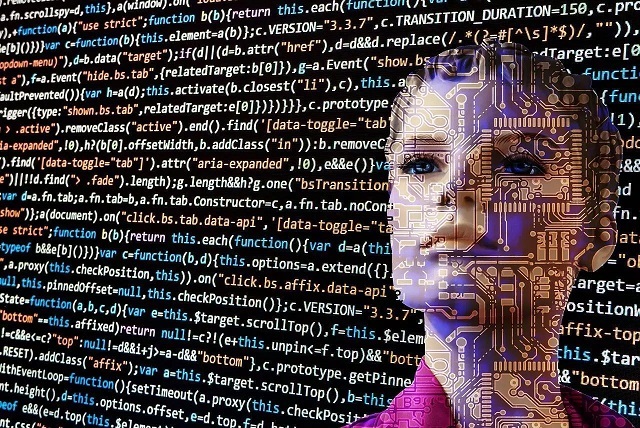
China Vanke, a Chinese real estate company, honored Cui Xiaopan as the best employee of 2021. Cui Xiaopan is not a real person but a virtual employee using artificial intelligence (AI). Cui Xiaopan was built with the image of a young girl and was developed by an internal team of Vanke. It joined Vanke's accounting department in February.
Similar to Cui Xiaopan, Tencent Holdings' robot reporter "Dreamwriter" can create a 1,000-word article in 60 seconds and read the news on television.
This virtual host taught itself the style of hosting from previous news reports. The male host can even read news with the voice of a real Xinhua presenter.
The advantage is that the robot can work 24/7 on the official Xinhua News Agency website as well as various social media platforms. This can help the news agency cut costs while still improving the efficiency of news production.
Virtual staff are also popular in the retail and entertainment sectors in China. Ayayi, Ling Yuezheng, and Angie are "virtual beauties" with hundreds of thousands of followers on social networks.
Mei Chen, head of high fashion for Alibaba Group Holding in the UK, Spain and Northern Europe, said that virtual KOLs (influencers) are extremely popular among young fans, especially Gen-Z consumers (those born between 1997 and 2012) who are always curious to try new things.
A report of market consulting firm Analysys shows that the outstanding performance of virtual employees is the reason why many Chinese companies have begun to plan to implement similar models.
The market will see more virtual workers with both business and technology capabilities among companies equipped with robotic process automation, low-code development platforms, and artificial intelligence technologies.
Advantage of virtual power
Unlike humans, AI staff can process thousands of streams of information, analyze user preferences and needs, and then make appropriate recommendations, thereby increasing customer satisfaction. Not only operate 24/7, they are also smarter with speech recognition and synthesis, and self-learning to handle the most natural conversational situations.
The outstanding benefit of AI employees is accuracy, reducing human-made errors, thereby helping to make decisions more correct. This is especially useful for businesses when it comes to cash flow management and financial planning in the future.
Virtual employees help reduce costs for human resources, maintenance fees, space rental fees, travel expenses, and marketing.
According to McKinsey, the difference in profit between companies that use AI well and the industry average is 5%. In the insurance sector, according to Gartner, AI is pervasive in all aspects of businesses.
A report by consulting firm Analysys found that when virtual employees set an example of high performance, other employees also feel encouraged to improve their skills, ultimately helping to accelerate digital transformation of companies.
According to FPT Corporation, thanks to the use of its FPT.AI switchboard virtual assistant tool, its partners can save 50% of operating costs and increase efficiency by 40%. An AI switchboard can make 100 calls per minute for customers, with 300,000 calls a month, which helps reduce the load on customer care staff, and at the same time surveying, identifying and extracting user-provided information into a database. Many of FPT's partners have gradually cut the customer service staff and replaced them with AI call center assistants.
The future
According to technology research firm IDC, In China's AI software market, apps for AI robots or virtual people have become one of the most popular apps. It is forecast that the value of this software segment will reach 23 billion yuan (about 3.6 billion USD) by 2030.
Meanwhile, iMedia's statistics show that the virtual idol market is expected to reach 12 billion yuan (1.8 billion USD) this year, up 10 times from 1.2 billion yuan in 2018.
Wang Shi, founder and former chairman of the Hong Kong and Shenzhen-listed real estate group, said in 2015 that 40% of its property management services will be conducted by robots in the next 10 years.
In Vietnam, AI technology has been strongly deployed. Dr. Bui Hai Hung, Director of VinAI Research Institute, said that over the years, AI has been deeply applied in many different fields, such as virtual assistants on mobile devices, smart homes and self-driving cars. AI has entered every corner of life to serve people's needs.
Dr. Dang Hoang Vu forecast that in the next 5-10 years, AI will continue to develop but will follow the direction of optimizing the user experience, and meeting the close and practical needs of people.
"After Covid-19, more businesses look for AI application tools. They can automate many tasks that previously required a lot of human resources such as customer care call centers. The matter of saving costs and increasing labor productivity is the most obvious effect from adding AI content to business operations,” FPT Technology Director Le Hong Viet said.
Mr. Dao Huu Phuc, Deputy General Director of Insurance and Information Technology Operations of FWD Vietnam, said that the current challenge is that customers are more demanding, so life insurance companies must have solutions. In this competition, businesses with digital transformation that focus on solving customer challenges will succeed.


